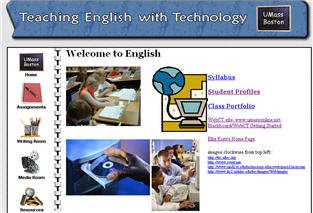Kajder begins this chapter with something that I often gloss over in my classroom - preparing students to search the web. Typically, when I bring my students to the media center to use the computers, I provide a brief and usually unsuccessful preparatory lesson for using the internet. I never really thought about it, but why don't I spend as much time preparing students for an online information search as I do preparing students to read a novel set during the Great Depression? as Kajder remarks, "(W)hy don't we empower students before we set them loose?" I think, like Kajder, I just assume that students already know how to search the internet and find appropriate information online. Kajder reminds me that I should never assume. She also reminds me that I really do need to not only evaluate what my students know, but what exactly I am sending them out into the world wide web to research.
This is where I see the value of Webquests. Webquests provide students with a task, process, and most importantly (for me and my young students) resources that are preselected by the teacher. As Kajder explains in Chapter 7, "Flexibility was not an option, simply becuase the search time had already been spent." Students are presented with websites that are provided by the teacher and therefore there is no question about their validity or appropriateness. I like this, especially when I think of my freshman and sophomore students surfing the web, looking for pertinent information.
However, as my students get older, and as I begin designing the curriculum for my 12th graders this fall, I don't want to completely control their online searches. I mean, they are seniors, they will be going to college (hopefully) the following year, and they need to learn how to search the internet and evaluate online texts. While I will probably use a Webquest with my senior writing class, I don't want to neglect the opportunity for my students to learn how to use the web. I like Kajder's search engine activity where she has students in her class team up and evaluate different search engines using the same key words.
One thing that I know I must change for next year is my attitude when entering the computer lab. I definitely need to be a more active teacher while my students are in the lab. I must admit that I am guilty - I bring a stack of tests, plant myself at a table, and grade while my students are searching online. I do remove myself from the pile of grading, ever 10 minutes or so, and do "the walk." I quickly peruse the screens on which my students are working, closing windows with solitaire or google earth or whatever else has nothing to do with what they should be doing. And then I return to grading. Kajder reiterates the fact that lab days are sometimes her busiest days of teaching. I need to remember that.
So...these chapters, along with the other assigned readings for this week really remind me of the fact that technology is not necessarily a tool that will make my life or my job easier. In fact, it may make it more...interesting and time consuming (I don't want to say difficult)...at least in the beginning. But the benefits far outweigh the time is will take to design an effective webquest or class website. Like anything new, it will just take time.
Course homepage

Course homepage
Subscribe to:
Post Comments (Atom)
2 comments:
Sarah, I think you're right -- we could all be little more proactive with students when it comes to surfing the Internet...
I'm going to second the agreement. They get into too much trouble, sad to say, without us watching over their shoulders. Games, wikipedia alterations, emailing, whatever it is... it isn't being productive.
Post a Comment